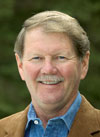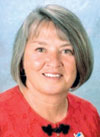 |
|
Mick Holm-D |
In 2006, Democrats wrested control of House District 3 when Rep. Doug Cordier, D-Columbia Falls, beat a three-time Republican incumbent. But Cordier isn’t running for reelection and his old opponent, along with another well-known resident, have jumped at the opportunity to fill his spot.
In a year where the two major political parties are battling for control of the Montana Legislature, that’s made this district one of the more hotly contested races this election.
 |
|
Dee Brown-R |
The former incumbent is back in the race: Dee Brown, of Hungry Horse, a retired teacher and owner of the Canyon RV & Campground, served as a Republican lawmaker in the House of Representatives from 2000-2007 until she was defeated by Cordier.
Her Democratic opponent is Mick Holm, who, while a first-time candidate, has tremendous name recognition in his own right. Holm, a Columbia Falls resident, retired as superintendent of Glacier National Park earlier this year.
Brown says her previous record and long-time presence in HD3 – she grew up in the district and runs her business there, today – speak to her understanding of the area’s issues.
“I remember when my parents wouldn’t let me ride my horse down Main Street because there were so many logging trucks,” she said. “I understand the changes the economy has gone through here, and I get the challenges facing small-business owners, because I am one.”
Brown retired from teaching in School District 6 in 1998, and has served on several local volunteer committees and state organizations, including the Montana Tourism Coalition and the Columbia Falls Area Chamber of Commerce. In the Legislature, she worked on the State Audit Committee.
If elected, she said she would oppose any new taxes, and would move to eliminate the state’s business equipment tax. She views the $400 million state general fund surplus at the end of the last fiscal year as “an overtax of the people,” and would like to work toward “permanent tax cuts.”
“We have more natural resource capability in southeastern Montana than all of Wyoming,” she said. “But we have a tax structure that slaps the hand of big business. Why would they want to settle here?”
Brown is a staunch supporter of developing southeast Montana’s coal tracts for coal-bed methane in order to bring in tax revenue to fund public schools. She says the state has been “throwing one-time money” at education, and that resource development would provide a lasting funding solution similar to what the state of Wyoming has achieved.
Another important upcoming legislative decision, Brown said, will be property tax reappraisal. It’s a subject that’s especially important to the Flathead, where property values have climbed in recent years.
“We need to make sure we’re not pricing Montana families out of their homes,” she said. “Everyone is concerned right now about how to make ends meet.”
While he may be a political newcomer, Holm says the concept is hardly new to him: “I’ve been in public service for a long time,” he said of his work in the park. “The lessons I learned there would transfer naturally, I think, to the Legislature.”
Holm is also a long-time Montana resident – he grew up just east of the Rocky Mountain Front in Brady and graduated from the University of Montana. He worked as a teacher in Willow Creek for a year before beginning his 33-year park service career.
Working with the park service, Holm said, has made him a staunch supporter of hunting, fishing and recreating on public lands. “Lands absolutely need to stay open for use; it’s part of why people live here,” he said.
It’s also impressed upon him the importance of upholding Montana’s Constitutional mandate to protect and improve the natural environment. He criticized his opponent for having a “drill it, dig it, cut it” attitude.
“It’s not as black and white as that,” Holm said. “We certainly need to develop our natural resources – we’ve got a lot of potential coal energy. But we don’t have to do that at the expense of that Constitutional mandate.”
He encouraged looking at clean-and-green energy sources, such as wind, hydroelectricity, solar and biodiesel, in addition to coal, as energy sources and growing business opportunities.
Holm said schools are best managed at the local level, and that sufficient funding is a must. But he stopped short of throwing more money at the current funding stalemate, saying that school administrators and boards must first prove they’re being fiscally responsible with current funding.
In light of the state budget surplus, Holm said he wouldn’t support any increased taxation. “It’s been five months of walking streets and knocking on about 1,800 doors,” he said. “And almost everyone says they’re concerned about the same things – economy, healthcare, education. Those are my priorities.”